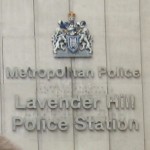 I have tended to shy away from national politics and issues in this blog, keeping it more focused on local and council issues. However, one subject that increasingly concerns me is the erosion of civil liberties in this country. Yesterday saw another little chunk of our freedoms eroded with section 76 of the Counter Terrorism Act coming into force.
I have tended to shy away from national politics and issues in this blog, keeping it more focused on local and council issues. However, one subject that increasingly concerns me is the erosion of civil liberties in this country. Yesterday saw another little chunk of our freedoms eroded with section 76 of the Counter Terrorism Act coming into force.
Photographers must now be a careful they don’t get the police in their photos for fear of arrest.
I have an interest in this because I have already (late last year, before s76 was in force) been stopped by the police for taking a photo. I was on Lavender Hill and my sin was to get a police car in a photo taken near Lavender Hill police station. Four officers questioned me because, apparently, my behaviour was suspicious – something I refused to acknowledge (though I would later admit it was a truly awful photo, bad framing and a bit of camera shake). I suppose you could argue that Al-Qaeda don’t realise those white cars with orange stripes are the police. I think it a bit unlikely.
This is already a remarkably common occurence. Within days of being stopped myself, I heard, through friends, of two other people who had been stopped and searched under section 44 of the Terrorism Act for taking photos at Clapham Junction. It seems that even before section 76 you had to be worried if you were innocently taking a photo.
I would stress I do not blame the police for this. They have to act according to the laws the government makes, and they have to fulfil their targets. The people I do blame are the government. And I’m not alone in this – Stella Rimington, a former head of MI5, today saying that Ministers are using the fear of terror to restrict civil liberties. One of her comments deserves quoting in full:
It would be better that the government recognised that there are risks, rather than frightening people in order to be able to pass laws which restrict civil liberties, precisely one of the objects of terrorism – that we live in fear and under a police state
Now you can argue that, of course, they aren’t going to be stopping the innocent tourist or hobbyist photographer. So what’s the point of the power? I’m guessing the average terrorist tries to blend in rather than look like a terrrorist, which implies the police are either going to have to question lots of innocent people in the hope of catching a terrorist, or they are going to have to rely on other intelligence. If the latter is the case, then why do they need powers like those given under the Terrorism Act 2000 and the Counter Terrorism Act 2008?
Many years ago I would have said that a police state could never happen in this country. Nowadays, it seems the Blair and Brown governments don’t just want to show that it could, they are actually working to make it a reality.
 We’re officially in recession, with a second quarter of ‘negative growth’, although we’ve gone three quarters without any growth. Unemployment is rising, so is crime, and house values are falling almost as quickly as high street names. So why is it, as a Conservative, I sorry for Gordon Brown?
We’re officially in recession, with a second quarter of ‘negative growth’, although we’ve gone three quarters without any growth. Unemployment is rising, so is crime, and house values are falling almost as quickly as high street names. So why is it, as a Conservative, I sorry for Gordon Brown?